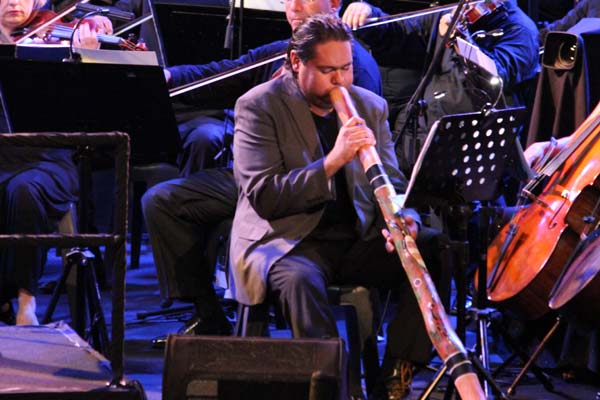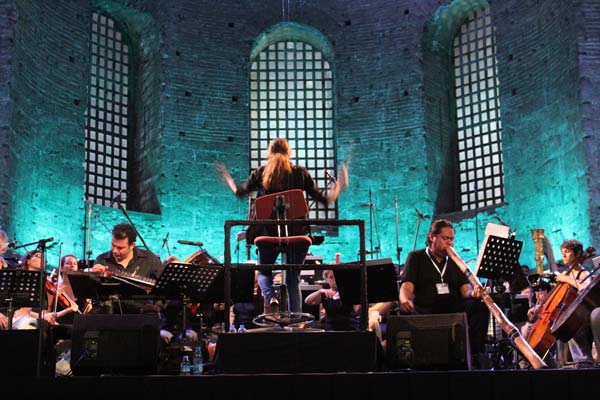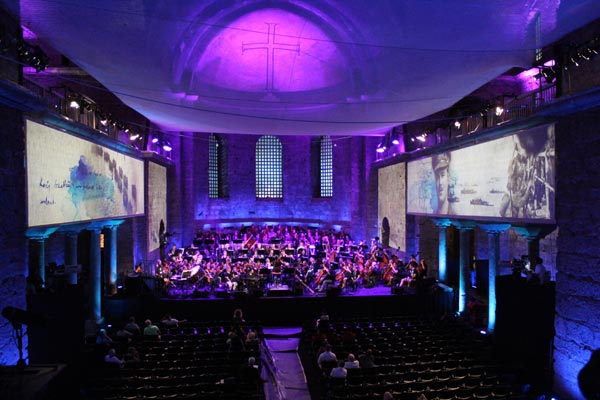Commemorating the centenary of the ANZAC landing at Gallipoli, ‘The Gallipoli Symphony’ is the first time the story of courage, camaraderie and sacrifice has been narrated musically.
Didgeridoo player, William Barton, is one of seven soloists performing the musical collaboration with Queensland Symphony Orchestra, The Gallipoli Choir and The Australian Voices and says his work with the project has brought him closer to the spirit of the ANZAC legend and those who gave themselves for freedom.
“I’ve been fortunate to be one of those musicians to be part of the [Gallipoli] ceremony. It was of great significance to revisit that special site three times, and then perform the premiere of ‘The Gallipoli Symphony’ in Istanbul on the fourth of August.
“Our conductor, Jessica [Cottis], was beautiful. She just brought it all together in a matter of days. This unfamiliar music that’s not necessarily technically known to get played as much in a European or Middle Eastern context. Jessica really pulled it together, it was magic.”
'The Gallipoli Symphony' brings 7 soloists and 11 composers from Australia, New Zealand, Turkey and England together to perform a combined composition recounting the heroism and horror of war, and the selfless commitment of thousands that should never be forgotten.
“We have a great bunch of musicians. From Michael Askill, Horomona Horo and a lad from England [Julian Jackson] who plays the harmonica, and of course Omar Faruk Tekbilek. So we’re like the soloists representing segments throughout the orchestral works by Australian composers, New Zealand composers and a few Turkish composers as well.
“You’re reflecting upon our fellow Australian and New Zealanders who lost their lives and for those who have returned. When I’m walking from the middle of the mountain at ANZAC Cove down to the shoreline where the flags are – in my mind, in my soul, in my heart – I feel that I’m representing Australia and those fallen soldiers from all sides, because it’s a very special ceremony in place.”
 William Barton
William Barton'The Gallipoli Symphony' is clearly an endeavour close to William’s heart, as he speaks with both a sense of pride and humbled respect for the opportunity to immortalise those who bravely served and give solace to their loved ones.
“We find an affinity that connects these fallen soldiers to back home. That’s my job as a musician, within my own soul and mind, to connect to that audience or all those people there. On that night at ANZAC Cove. Those whose families have been lost, or are still alive. Who have survived that particular wartime moment in history. To give them some sort of gratitude in the sense of their coming home, their spirits coming home, or at least they lie in rest there in comfort.”
While the didgeridoo is not an instrument commonly associated with classical music, William has carved an incredible career as a versatile performer, making his QSO debut in 1998 and becoming the first didgeridoo player in-residence with a symphony orchestra.
 “I think it was a very organic process,” William says of his transition into classical music. “I was encapsulated by my mother, who’s still with us today, playing classical music to me before I was born and after I was born. This beautiful world of sound of a different nature that still correlated with Australia’s culture.
“I think it was a very organic process,” William says of his transition into classical music. “I was encapsulated by my mother, who’s still with us today, playing classical music to me before I was born and after I was born. This beautiful world of sound of a different nature that still correlated with Australia’s culture.“It’s about having something that’s strong within your heart that you can connect with an audience of your society right now right here and make a statement through music. You don’t have to say what it’s about it’s more about the music. It’s a beautiful thing.”
‘The Gallipoli Symphony’ performs Queensland Performing Arts Centre 24 November.

